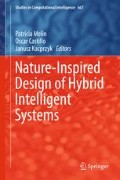Abstract
A study of the optimization of different types of membership functions (MF) using Bee Colony Optimization (BCO) for the stabilization of fuzzy controllers is presented. The main objective of the work is based on the main reasons for the comparative analysis of BCO as an optimization technique for the design of the Mamdani fuzzy controllers, specifically in tuning membership functions for two problems in fuzzy control. Simulations results confirmed that using the BCO to optimize the membership functions and the scaling gains of the fuzzy system improved the controller performance. The six metrics of the ITAE, ITSE, IAE, ISE, RMSE and MSE for the errors in control are implemented.
Access this chapter
Tax calculation will be finalised at checkout
Purchases are for personal use only
References
Amador-Angulo, O. Castillo, “Comparison of Fuzzy Controllers for the Water Tank with Type-1 and Type-2 Fuzzy Logic”, NAFIPS 2013, Edmonton, Canada, pp. 1 -6, 2013.
Amador-Angulo L., Castillo O., “A Fuzzy Bee Colony Optimization Algorithm Using an Interval Type-2 Fuzzy Logic System for Trajectory Control of a Mobile Robot”. MICAI pp. 460-471, 2015.
Amador-Angulo A., Castillo O.: “Statistical Analysis of Type-1 and Interval Type-2 Fuzzy Logic in dynamic parameter adaptation of the BCO”. IFSA-EUSFLAT, pp. 776-783, 2015.
Biesmeijer, J. C. and Seeley T. D., “The use of waggle dance information by honey bees throughout their foraging careers”, Behavioral Ecology and Sociobiology, Vol. 59, Vo. 1, pp. 133-142, 2005.
Bonabeau E., Dorigo M., Theraulaz G., “Swarm Intelligence”. Oxford University Press, Oxford, 1997.
Brown S.C. and Passino K. M., “Intelligence Control for an Acrobat”, Journal of Intelligence and Robotic Systems, pp. 209-248, 1997.
Caraveo C., Valdez F. and Castillo O., “Optimization of fuzzy controller design using a new bee colony algorithm with fuzzy dynamic parameter adaptation”, Applied Soft Computing, Vol. 43, pp. 131-142, 2016.
Castillo O., Martinez-Marroquin R., Melin P., Valdez P, and Soria J.: “Comparative study of bio-inspired algorithms applied to the optimization of type-1 and type-2 fuzzy controllers for an autonomous mobile robot”, Information Sciences, Vol. 192, No. 1, pp. 19-38, 2010.
Chong C. S., Low M. Y. H., Sivakumar A. I., and Gay K. L.: “A bee colony optimization algorithm to job shop scheduling”, in Proceedings of the 2006 Winter Simulation Conference, pp. 13-25, 2006.
Dyler F. C.,“The biology of the dance language”, Annual Review of Entomology, Vol. 47, pp. 917-949, 2002.
Karakuzu C., “Parameters tuning of fuzzy sliding mode controller using particle swarm optimization”, International Journal Innovative Computing Information Control, Vol. 6, pp. 4755-4770, 2010.
Lučić P. and Teodorović D., “Computing with Bees: Attacking Complex Transportation Engineering Problems”, International Journal on Artificial Intelligence Tools, Vol. 12, No. 3, pp. 2003.
Lučić, P. and Teodorović, D., “Vehicle routing problem with uncertain demand at nodes: the bee system and fuzzy logic approach”. In Verdegay, J.L. (Ed.): Fuzzy Sets in Optimization Springer-Verlag. Heidelberg, Berlin, pp. 67-82, 2003.
Lučić, P. and Teodorović, D., “Transportation modeling: an artificial life approach”, In: Proceedings of the 14th IEEE International Conference on Tools with Artificial Intelligence, Washington, DC, pp. 216-223, 2002.
Mamdani, E.H. and Assilian S.: “An experiment in linguistic synthesis with fuzzy logic controller”. International Journal of Man-Machine Studies, pp. 1-13, 1975.
Pham, D. T., Darwish A. Haj., Eldukhri E. E. and Otri, S., “Using the Bees Algorithm to tune a fuzzy logic controller for a robot gymnast”. Innovative Production Machines and Systems, online, pp. 1-2, 2007.
Teodorović D, “Swarm Intelligence Systems for Transportation Engineering: Principles and Applications”, Transp. Res. Pt. C-Emerg. Technol., Vol. 116, pp. 651-782, 2008.
Teodorović, D., Lućić P., Marcković G., Orco, M. Dell’, “Bee colony optimization: principles and applications”. In: Reljin, B. Stanković, S. (Eds.): Proceedings of the Eight Seminar on Neural Network Applications in Electrical Engineering- NEUREL, University of Belgrade, Belgrade pp. 151-156, 2006.
Teodorović D., Selmić M., “The BCO algorithm For The p Median Problem”, In: Proceedings of the XXXIV Serbian Operations Research Conference, Zlatibor, Serbia, 2007.
Tiacharoen S. and Chatchanayuenyong T.: “Design and Development of an Intelligent Control by Using Bee Colony Optimization Technique”, American Journal of Applied Sciences, Vol. 9, No. 9, pp. 1464-1471, 2012.
Von Frisch K.,“Decoding the language of the bee”, Science, Vol. 185, No. 4152, pp. 663-668, 1974.
Wong, L. P., Low, M. Y. H. and Chong, C. S., “A bee colony optimization algorithm for traveling salesman problem”, in proceedings of Second Asia International Conference on Modeling & Simulation (AMS), pp. 818-823, 2008.
Yen, J.,Langari R.: Fuzzy Logic: Intelligence, Control and Information. Prentice Hall, 1999.
Zadeh, L.A., “Fuzzy sets”, Information Control, Vol.8, pp. 338-353, 1965.
Zadeh, L. A.: The concept of a linguistic variable and its application to approximate reasoning, Part I. Information Sciences 8, pp. 199-249, 1975.
Zadeh, L. A.: The concept of a Linguistic Variable and its Application to Approximate Reasoning, Part II, Information Sciences 8, pp. 301-357, 1975.
Zadeh, L.A.: Toward a theory of fuzzy information granulation and its centrality in human reasoning and fuzzy logic, Fuzzy Sets and Systems, Vol. 90, Elsevier, pp. 117-117, 1997.
Author information
Authors and Affiliations
Corresponding author
Editor information
Editors and Affiliations
Rights and permissions
Copyright information
© 2017 Springer International Publishing AG
About this chapter
Cite this chapter
Amador-Angulo, L., Castillo, O. (2017). Comparative Analysis of Designing Differents Types of Membership Functions Using Bee Colony Optimization in the Stabilization of Fuzzy Controllers. In: Melin, P., Castillo, O., Kacprzyk, J. (eds) Nature-Inspired Design of Hybrid Intelligent Systems. Studies in Computational Intelligence, vol 667. Springer, Cham. https://doi.org/10.1007/978-3-319-47054-2_36
Download citation
DOI: https://doi.org/10.1007/978-3-319-47054-2_36
Published:
Publisher Name: Springer, Cham
Print ISBN: 978-3-319-47053-5
Online ISBN: 978-3-319-47054-2
eBook Packages: EngineeringEngineering (R0)

